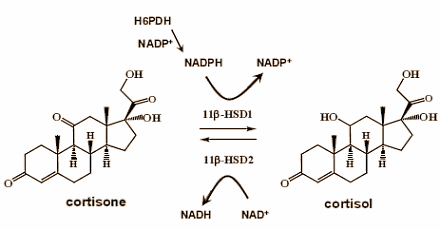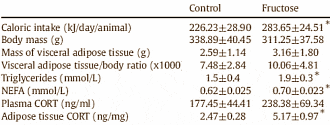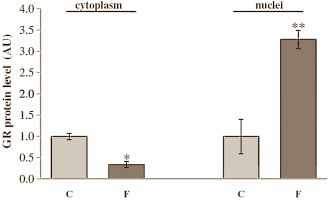berk
Member
- Joined
- Dec 28, 2019
- Messages
- 320
Biochemists at the University of Belgrade published in the Journal of Nutritional Biochemistry the results of a study in which they examined another potentially fattening aspect of fructose: the effect of cortisol in fat cells.
Throughout the world there are a couple of dozen laboratories that are working on developing slimming aids that deactivate this hormone in fat deposits by blocking the enzyme 11-beta-HSD-1. This is the enzyme that converts the inactive hormone cortisone into the active hormone cortisol. Cortisol is a stress hormone that inhibits muscle growth but stimulates the growth of fat cells.

Study
The Serbian researchers studied two groups of male lab rats. One group was given ordinary drinking water [Control]; the other was given drinking water that contained 10 percent fructose [Fructose].
Results
After nine weeks the rats in the fructose group ate more than the animals in the control group. The fructose rats had slightly more abdominal fat than the control rats, but the difference was not statistically significant.
The amount of free fatty acids [NEFA] in the blood of the fructose rats was significantly higher than the amount in the control rats. If you burn the free fatty acids there's no problem. If you don't, a high concentration of free fatty acids in your blood spells disaster in the long term. The fatty acids build up in your muscles and organs and end up sabotaging their functioning.
The fructose diet didn't increase the number of cortisol receptors [GR] in the fat cells, but the researchers did find considerably higher numbers of cortisol receptors in the cell nuclei. These were probably receptors activated by cortisol, which then pass on instructions to the DNA in the fat cells.



In the fat cells the researchers found more 11-beta-HSD-1 and more H6PDH. H6PDH is an enzyme that provides energy to 11-beta-HSD-1, so it can carry out its work.
Conclusion
The researchers were not able to confirm the theory that 11-beta-HSD-1 and H6PDH blockers are slimming aids. They didn't observe a significant increase in the abdominal fat of their lab animals, but their study does suggest that a low-fructose diet is interesting for anyone wanting to reduce their cortisol levels.
Source:
J Nutr Biochem. 2013 Jun;24(6):1166-72.
Throughout the world there are a couple of dozen laboratories that are working on developing slimming aids that deactivate this hormone in fat deposits by blocking the enzyme 11-beta-HSD-1. This is the enzyme that converts the inactive hormone cortisone into the active hormone cortisol. Cortisol is a stress hormone that inhibits muscle growth but stimulates the growth of fat cells.

Study
The Serbian researchers studied two groups of male lab rats. One group was given ordinary drinking water [Control]; the other was given drinking water that contained 10 percent fructose [Fructose].
Results
After nine weeks the rats in the fructose group ate more than the animals in the control group. The fructose rats had slightly more abdominal fat than the control rats, but the difference was not statistically significant.
The amount of free fatty acids [NEFA] in the blood of the fructose rats was significantly higher than the amount in the control rats. If you burn the free fatty acids there's no problem. If you don't, a high concentration of free fatty acids in your blood spells disaster in the long term. The fatty acids build up in your muscles and organs and end up sabotaging their functioning.
The fructose diet didn't increase the number of cortisol receptors [GR] in the fat cells, but the researchers did find considerably higher numbers of cortisol receptors in the cell nuclei. These were probably receptors activated by cortisol, which then pass on instructions to the DNA in the fat cells.



In the fat cells the researchers found more 11-beta-HSD-1 and more H6PDH. H6PDH is an enzyme that provides energy to 11-beta-HSD-1, so it can carry out its work.
Conclusion
The researchers were not able to confirm the theory that 11-beta-HSD-1 and H6PDH blockers are slimming aids. They didn't observe a significant increase in the abdominal fat of their lab animals, but their study does suggest that a low-fructose diet is interesting for anyone wanting to reduce their cortisol levels.
Source:
J Nutr Biochem. 2013 Jun;24(6):1166-72.
